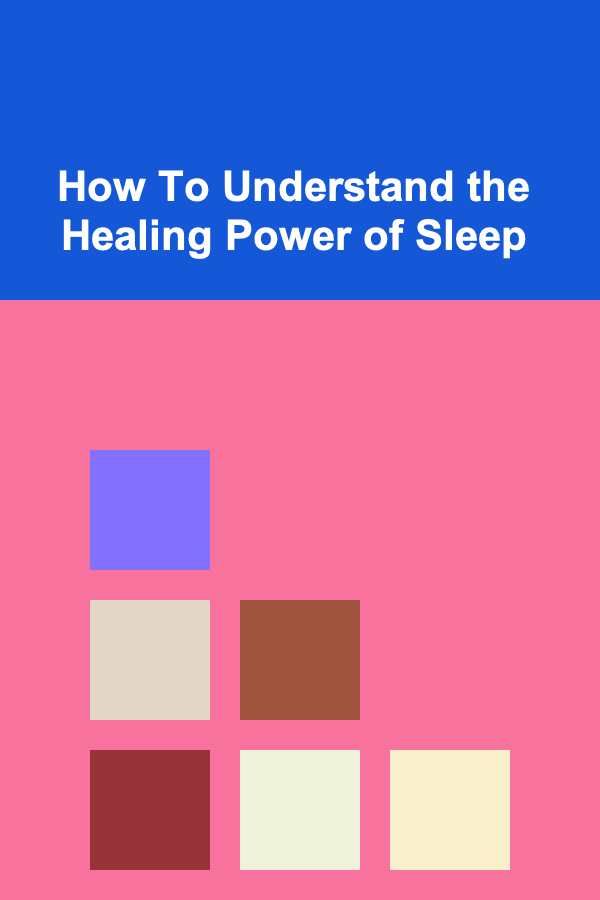
How To Understand the Healing Power of Sleep
ebook include PDF & Audio bundle (Micro Guide)
$12.99$7.99
Limited Time Offer! Order within the next:

Sleep is a natural, essential process that profoundly affects our physical, mental, and emotional health. Often, it's something we take for granted until we start experiencing the consequences of not getting enough of it. For many, sleep is just a means of restoring energy for the next day, but it is much more than that. In fact, sleep is one of the most powerful and intricate healing tools our body has at its disposal. Understanding the healing power of sleep not only helps us appreciate its importance but also motivates us to prioritize it for our overall well-being.
The Science of Sleep: A Complex Biological Process
Before delving into the specific healing benefits, it's essential to understand the biological process behind sleep. Sleep is controlled by the brain, specifically by two primary systems: the circadian rhythm and the sleep-wake homeostasis. The circadian rhythm is our internal 24-hour clock, regulating the timing of sleep, while sleep-wake homeostasis maintains the balance of sleep and wakefulness, ensuring that we get enough sleep to restore our body.
The sleep process itself is divided into two main stages: Non-Rapid Eye Movement (NREM) sleep and Rapid Eye Movement (REM) sleep. These stages alternate throughout the night, with each having its own critical role in maintaining health.
- NREM Sleep is the deeper stage of sleep and is divided into three stages. It is the phase when the body undergoes physical restoration, such as muscle growth, tissue repair, and immune system strengthening. During NREM sleep, the brain consolidates memories and processes information accumulated throughout the day.
- REM Sleep is where most of our dreaming occurs, and it plays a critical role in emotional and cognitive health. During this phase, the brain processes emotions, stores long-term memories, and strengthens neural connections. It is vital for mental restoration, creativity, and problem-solving abilities.
The Healing Power of Sleep: Physical Restoration
Sleep's most well-known and tangible benefit is its ability to restore the body physically. The healing process begins the moment we enter deep sleep, particularly during NREM stages. Several key mechanisms are at play in how sleep helps our body recover and rejuvenate.
1. Muscle Repair and Growth
During deep sleep, the body releases growth hormones that play a vital role in muscle repair and growth. These hormones promote tissue repair, help with the synthesis of protein, and aid in the recovery of muscles after physical exertion. For athletes or anyone who engages in strenuous activity, sleep is essential for muscle recovery and strength building.
2. Immune System Boost
Sleep is also crucial for a robust immune system. When we sleep, our immune system is more active, producing cytokines, which are proteins that help fight infections, inflammation, and stress. A lack of sleep has been shown to impair the production of these cytokines, leaving the body more vulnerable to illness. Chronic sleep deprivation weakens the immune system, making it harder for the body to fight off infections and recover from illnesses.
3. Cellular Repair and Regeneration
During sleep, cellular repair processes are accelerated. The body works to repair and regenerate cells, particularly in the skin, muscles, and organs. This repair mechanism helps combat the effects of aging, environmental stressors, and physical wear and tear. Essentially, sleep acts as a natural restorative mechanism that keeps the body functioning at optimal levels.
4. Heart and Cardiovascular Health
Sleep has a profound impact on cardiovascular health. Studies show that insufficient sleep is a risk factor for heart disease, high blood pressure, and stroke. During sleep, blood pressure decreases, allowing the heart to rest and recover. Chronic sleep deprivation leads to an increase in stress hormones like cortisol, which can raise blood pressure and increase the risk of cardiovascular problems over time.
The Healing Power of Sleep: Mental and Emotional Restoration
While the physical benefits of sleep are crucial, the mental and emotional benefits of sleep are equally important. In fact, sleep is the brain's primary method for healing and restoration. Without adequate sleep, the brain struggles to process emotions, store memories, and maintain cognitive function.
1. Memory Consolidation and Cognitive Function
One of the most well-documented benefits of sleep is its role in memory consolidation. During sleep, the brain processes the information we've accumulated during the day, storing and organizing it for future use. This process is essential for learning, problem-solving, and maintaining cognitive abilities. REM sleep, in particular, is critical for consolidating emotional memories and aiding in the retention of new knowledge. Without enough sleep, the brain struggles to process information efficiently, leading to poor concentration, memory lapses, and cognitive fatigue.
2. Emotional Regulation and Mental Health
Sleep is closely linked to emotional well-being. Lack of sleep disrupts the regulation of emotions, making us more prone to stress, anxiety, and depression. Sleep helps to reset the emotional centers in the brain, allowing us to cope with stressors effectively. People who consistently get enough sleep are better equipped to manage emotions, while those who are sleep-deprived tend to have heightened emotional responses, making it harder to navigate difficult situations.
Furthermore, sleep plays a vital role in mental health disorders. Chronic sleep deprivation is associated with an increased risk of developing mental health issues such as anxiety, depression, and bipolar disorder. Quality sleep provides the brain with the time it needs to process emotional experiences, helping to stabilize mood and improve resilience against emotional stress.
3. Creativity and Problem-Solving
Sleep is also essential for creative thinking and problem-solving. During REM sleep, the brain processes information in a way that fosters creativity. It makes novel connections between seemingly unrelated ideas and helps in finding innovative solutions to problems. This is why sleep is often called the "brain's reset button," as it allows us to approach challenges with a fresh perspective and improved cognitive flexibility.
The Healing Power of Sleep: Impact on Longevity
There is growing evidence suggesting that sleep plays a key role in longevity. The relationship between sleep and lifespan is not yet fully understood, but research indicates that both too little and too much sleep can negatively affect health and reduce lifespan. On the other hand, optimal sleep can promote a longer, healthier life.
1. Hormonal Balance
Sleep helps regulate critical hormones that control appetite, metabolism, and stress. Sleep deprivation disrupts the balance of hormones like leptin and ghrelin, which regulate hunger, leading to overeating and weight gain. Chronic sleep deprivation can also lead to elevated cortisol levels, a stress hormone linked to various health problems, including heart disease, obesity, and diabetes. By ensuring hormonal balance, sleep supports overall health and longevity.
2. Brain Aging and Neurodegenerative Diseases
Sleep is essential for brain health, particularly as we age. During sleep, the brain clears out toxins and waste products that accumulate throughout the day. This includes beta-amyloid, a protein associated with Alzheimer's disease. Studies suggest that poor sleep increases the risk of neurodegenerative diseases by failing to remove these harmful proteins. By maintaining good sleep habits, we can reduce the risk of cognitive decline and extend brain health as we age.
The Healing Power of Sleep: Practical Tips for Better Sleep
Understanding the healing power of sleep is one thing, but ensuring we get enough restorative sleep is another. Here are some practical tips to help improve sleep quality:
1. Maintain a Consistent Sleep Schedule
Try to go to bed and wake up at the same time every day, even on weekends. Consistency helps regulate the body's internal clock, making it easier to fall asleep and wake up naturally.
2. Create a Sleep-Friendly Environment
Ensure that your sleep environment is conducive to rest. Keep the room dark, quiet, and cool, and invest in a comfortable mattress and pillows. Minimizing distractions, such as electronics and noise, can help you get more restful sleep.
3. Practice Relaxation Techniques
Incorporate relaxation techniques such as meditation, deep breathing, or gentle stretching before bed to calm the mind and body. Reducing stress can make it easier to fall asleep and enjoy restorative rest.
4. Limit Stimulants
Avoid caffeine, nicotine, and heavy meals close to bedtime, as these can interfere with sleep quality. Limit screen time as well, as the blue light emitted by phones and computers can disrupt the production of melatonin, the hormone that regulates sleep.
5. Get Regular Exercise
Exercise promotes better sleep by reducing stress and helping the body relax. However, avoid intense exercise close to bedtime, as it may make it harder to fall asleep.
Conclusion: The Transformative Healing Power of Sleep
Sleep is not just a passive state; it is an active and essential process that supports healing, rejuvenation, and overall well-being. From physical restoration to mental clarity and emotional resilience, the benefits of sleep are profound and far-reaching. Prioritizing sleep and understanding its healing power can lead to improved health, longevity, and a better quality of life.
In a world where we often neglect our sleep in favor of work, social obligations, and technology, it's important to remember that sleep is not a luxury but a necessity. By recognizing and honoring the healing power of sleep, we give our bodies and minds the rest they need to function at their best, ultimately allowing us to live healthier, more fulfilled lives.

How to Embrace Imperfection in Your Organized Space
Read More
How to Incorporate DIY Wall Decor into Your Budget-Friendly Home
Read More
How to Keep Track of Antique Restoration Projects
Read More
How to Organize Recipes by Dietary Restrictions
Read More
How to Save for Travel Without Disrupting Your Budget
Read More
How to Set Financial Goals for Your Home Budget
Read MoreOther Products

How to Embrace Imperfection in Your Organized Space
Read More
How to Incorporate DIY Wall Decor into Your Budget-Friendly Home
Read More
How to Keep Track of Antique Restoration Projects
Read More
How to Organize Recipes by Dietary Restrictions
Read More
How to Save for Travel Without Disrupting Your Budget
Read More